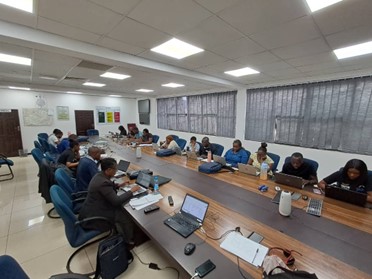
The UK Health Security Agency (UKHSA) International Health Regulations Strengthening Project (IHR-SP) partnered with Zambia National Public Health Institute (ZNPHI) to initiate a comprehensive R training programme for ZNPHI staff. This initiative was driven by a skills gap identified during ZNPHI’s internal needs assessment, which highlighted key areas for technical development within the public health workforce. The training aimed to enhance ZNPHI’s capability to conduct routine surveillance and effectively analyse data during public health outbreaks and research initiatives.
A call for expression of interest generated significant enthusiasm across various departments within ZNPHI. The training attracted a diverse cohort of professionals, including surveillance specialists, emergency preparedness and response experts, laboratory scientists, monitoring and evaluation specialists, and students from the Field Epidemiology Training Program (FETP), which UKHSA co-delivers with Levy Mwanawasa Medical University and the University of Zambia.
Following a competitive selection process, 26 participants were accepted into the in-person training programme, held at the ZNPHI headquarters in Lusaka.
IHR-SP Zambia developed the full training plan which was structured across six weekly sessions between 23 September and 14 November 2024. The training was a collaborative effort, co-facilitated by experienced colleagues from ZNPHI and the World Health Organization (WHO), bringing a wealth of expertise to the sessions. The IHR-SP Zambia Country Lead served as the lead trainer, both in developing the core training materials, session scripts, post-training assessment and in delivering the training. WHO provided additional support where required.
The course provided a foundational understanding of R for data analysis. Topics covered included:
- Introduction to R and RStudio: Setting up the environment and navigating RStudio for project management
- Basic R syntax and operations: using fundamental R commands, functions, and scripts, with an emphasis on code documentation
- Working with objects and data types: creating and manipulating data structures and performing arithmetic and logical operations
- Data import and exploration: managing file paths, importing data using the rio package, handling missing data, and gaining initial insights from data frames
- Data wrangling with dplyr: dplyr functions to select, modify, filter and prepared data for analysis
- Visualisation with ggplot2: creating informative, multi-layered, and visually appealing plots using the ggplot2 package
A proactive and responsive approach to participant feedback was implemented throughout the training. Based on mid-course feedback, the facilitator adjusted the training pace and allocated more time towards practical examples, ensuring stronger comprehension and engagement.
Of the 26 participants, 18 successfully completed the course, fulfilling the assessment-based attendance requirements. All 18 passed the final assessment demonstrating a strong grasp of foundational R skills. They are now eligible to enroll in intermediate-level R training which will be delivered by IHR-SP Zambia. This next phase will further enhance their analytical capability and contribute meaningfully to ZNPHI’s data-driven public health response efforts.
Useful Resources
Related Articles
-
First-of-its-kind Community-Based Surveillance Training in Mardan to Boost Pakistan’s Disease Preparedness and response
BY Najma, Mirza Zeeshan Iqbal Baig, Nadia Nisar, Dr Muhammad Sartaj -
IHR-SP supports the Senior Leadership Symposium of the Nigeria Centre for Disease Control and Prevention
BY IHR -
Cross-continental learning builds ASEAN’s Public Health Emerging Leaders
BY Paul Furtado, Dingase Faith Mvula, Inneke Suhanda -
Fourth Regional Training of Trainers on Public Health Emergency Operations Centres in Africa
BY IHR -
From Nigeria to The Gambia: IHR-SP advances cross-sectoral leadership in public health
BY Paul Irabor


Please Sign in (or Register) to view further.